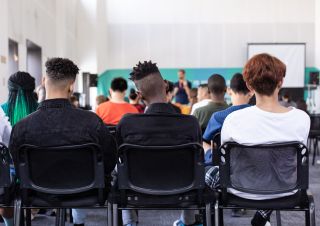Education
Difference Education for College Students
Teaching students about others' backgrounds can shape their college experience.
Posted March 14, 2023 Reviewed by Abigail Fagan
Key points
- Difference education exposes college students to other students' diverse backgrounds and how those shape the college experience.
- Research shows that difference education improves all students' adjustment to college but is especially impactful for first-generation students.
- First-generation students who experience difference education benefit academically, behaviorally, cognitively, and even physiologically.

I’ll always have a spot in my heart for student panels. As a junior at Albion College, I served on a panel designed to assuage nervous parents regarding what life would be like for their soon-to-matriculate children. We fielded questions ranging from “How do students check out of campus?” (they don’t) to “How will I be notified if my kid fails a class?” (you won’t). But it’s not the parents who made this a special memory; it’s the fact that I was sitting next to the woman who would later that summer become my girlfriend, and who is still by my side 19 years later.
But student panels are about more than matchmaking; they can be a fount of knowledge for students hoping to learn how college “really works.” More than that, research led by Dr. Nicole Stephens has shown that panels like these that highlight differences in students’ backgrounds, and how those differences influence their college experience, can have a profound impact on educational outcomes—especially for those first-generation students whose parents didn’t attend college.
Difference Education
In the original test of this “Difference Education,” 168 students in their first few weeks at a four-year university attended a one-hour panel of culturally diverse senior peers who shared their own stories of challenge and success during the first year of college. Unbeknownst to the audience, panelists’ stories varied across sessions. In the difference-education intervention, panelists related how whether their parents did (continuing-generation) or did not (first-generation) attend college—and the (dis)advantages associated with that background—shaped their experience of higher education.
Two elements of this difference-informed approach set it apart from other orientations or interventions designed for first-generation students:
- The goal of difference education is not simply to cast first-generation status in a positive light. For example, a first-generation panelist discussed how not having family who attended college meant they couldn’t get advice from parents or siblings, but that it forced them to ask for help on campus. In this way, being first-generation is construed as neither good nor bad, but merely a fact that informs the college experience.
- Difference education also constructively exposes first-generation students to the more privileged backgrounds of other students. For example, a continuing-generation panelist discussed that their private high school provided small classes and individualized college prep, but that 500-person lecture classes now left them feeling lost and overwhelmed. Thus, all students’ backgrounds are portrayed—not as equivalent—but as having both upsides and downsides.
Dr. Stephens and her team then tracked students’ first-year GPAs. As hypothesized, continuing-generation students’ GPAs (~3.5 overall) were largely unaffected by the panel, whereas first-generation students’ GPAs were boosted from a 3.1 to a 3.4. Although it didn’t appear to help continuing-generation students academically, all students who experienced difference education reported significantly less stress and anxiety, better adjustment to college life, and more academic and social engagement.
Replicating difference education
A few years later, Dr. Stephens and her colleagues replicated difference education with a few important changes:
- Tested with 133 students at a different university
- Tracked students’ GPAs for two years instead of one
- Adapted to online delivery, using vignettes from senior peers rather than an in-person panel
This last adaptation is clearly important to allow difference education to be scaled to all incoming students, including those who may not attend classes on campus. Despite these changes, the outcomes were remarkably similar: Continuing-generation students’ second-year cumulative GPAs were largely unaffected (~3.4) whereas first-generation students’ GPAs jumped from 3.1 to nearly 3.5.
Finally, the researchers looked at students’ academic performance as seniors themselves, a full 4 years following difference education. Combining samples from both the in-person and online studies, the impact was still evident among first-generation students, whose final cumulative GPAs were ~0.2 points higher than the control group and no different from their continuing-generation peers. Impressively, 46% of first-generation students in the difference education group earned academic honors compared to only 13% of students in the control group.
Why does difference education help first-generation students?
Throughout these studies, Dr. Stephens and her team explored multiple mechanisms to explain the impact of difference education. In the original study, the positive effect on GPA was largely explained by first-generation students who experienced difference education asking for more help from campus resources in their first year. In the replication, first-generation students who attended the difference-education panel reported higher levels of empowerment, psychological thriving, and social fit.
Difference education may even change how first-generation students process stress physiologically. Over a year after the in-person difference-education panel, 133 of the original participants experienced the Trier Social Stress Test, which involves writing and delivering an impromptu speech and completing challenging GRE problems under time pressure. During the stress test, participants provided saliva samples to measure their metabolic reaction to this situation. First-generation students who had been at the difference-education panel had a better balance of anabolic hormones (the good part of stress that makes you ready to take on the world) to catabolic hormones (the bad part of stress that makes you panic). Thus, exposure to students’ backgrounds and how that shapes their experience, for better or worse, appears to influence first-generation students academically, behaviorally, cognitively, and physiologically.
Applying difference education in college
These studies, conducted over the past decade, make a compelling case for difference education for incoming college students, whether delivered as an in-person panel, online series of vignettes, or some other way. No matter the medium, difference education should enrich students’ stories by tying into their social identities and portraying those backgrounds as affording both opportunities and obstacles to overcome. Difference education may be another valuable, evidence-based tool to improve student persistence as higher education becomes increasingly diverse yet still struggles with equity gaps that affect its most vulnerable populations.
It has been challenging to determine, however, whether this approach has made its way from the pages of academic journals to the practice of any college programs. If you’re reading this, I would love to hear from you—does your college engage in difference education? Is it a program you came upon organically or was it constructed based on this research? What stories, ideas, and recommendations can you share with other colleges interested in this strategy?
References
Stephens, N. M., Hamedani, M. G., & Destin, M. (2014). Closing the social-class achievement gap: A difference-education intervention improves first-generation students' academic performance and all students' college transition. Psychological Science, 25(4), 943-953.
Stephens, N. M., Townsend, S. S. M., Hamedani, M. G., Destin, M., & Manzo, V. (2015). A difference-education intervention equips first-generation college students to thrive in the face of stressful college situations. Psychological Science, 26(10), 1556-1566.
Townsend, S. S. M., Stephens, N. M., & Hamedani, M. G. (2021). Difference-education improves first-generation students' grades throughout college and increases comfort with social group difference. Personality and Social Psychology Bulletin, 47(10), 1510-1519.
Townsend, S. S. M., Stephens, N. M., Smallets, S., & Hamedani, M. G. (2019). Empowerment through difference: An online difference-education intervention closes the social class achievement gap. Personality and Social Psychology Bulletin, 45(7), 1068-1083.




